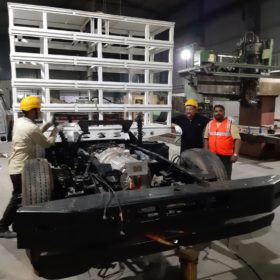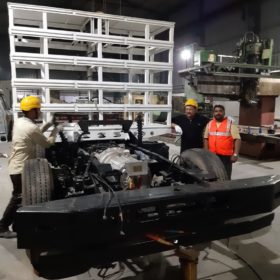India’s IPLTech to use Faradion sodium-ion batteries for commercial vehicles

The Gurgaon-based data-driven fleet service provider—which launched India’s first all-electric heavy-duty truck last year—will use Faradion’s sodium-ion batteries in its commercial vehicles.
UK-based Faradion has partnered Infraprime Logistics Technologies (IPLTech), a Gurgaon-based heavy goods vehicle fleet service provider, on use of its high-energy sodium-ion batteries for IPLTech’s commercial vehicles in the Indian market.
The announcement comes just a few weeks after Faradion bagged its first major order from Australia and announced plans to manufacture its sodium-ion (Na-ion) batteries in India for electric mobility, energy storage and mobile applications.
Faradion, along with its partner in India, aims to set up an initial production capacity of 1 GWh in the country.
On use of Faradion batteries, Siddhartha Das Executive Chairman IPLTech said in a company statement, “We are driven to minimise the heavy pollution caused by heavy goods vehicles in India. Our full electric mega trucks are the first of their kind to be integrated and deployed in India. We believe that the Faradion technology can provide the Indian market an effective solution at competitive prices.”
“Faradion has seen significant interest in several markets, including the US, Europe and Australia due to its performance, safety and price point,” saidJames Quinn, CEO of Faradion, adding “India was the next logical region for Faradion, given the market conditions.”
“Faradion is accelerating large-scale industrialisation of its safe, low-cost, Sodium-ion energy storage technology. The partnership with IPLTech reflects an important milestone in our commitment to the market and the Prime Minister’s Make In India vision, as we also shortly commence manufacturing in India.”
Li-ion Vs Na-ion
Faradion is actively pushing its sodium-ion batteries as a superior alternative to lithium-ion batteries, citing their advantages in performance, safety and price point.
Speaking about India-specific advantages, Quinn earlier told pv magazine, “A vast majority of the raw materials are available in India for a vertically integrated supply chain. We use zero cobalt, zero lithium, zero graphite and zero copper in our cells, thus reducing the bill of materials (which constitutes 75-80% of the cell cost). This less expensive, safer and more sustainable solution will allow India to have Energy Security (economic security, national security and environmental security).”
Further, the Faradion Na-ion cells can be made on existing commercial Li-ion manufacturing lines. The operating temperature range is -30 to +60 degrees, Quinn told pv magazine.
“Our cell chemistry provides world-leading cell-specific energy of 150-160 Wh/kg for sodium-ion,” he said, adding the company aims to generate cells with >190 Wh/kg in the second half of 2020.


